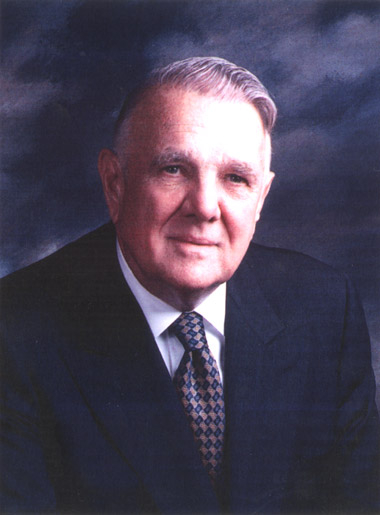Delford M. Smith*
Class of 2002
- Founder and Chairman of the Board Evergreen International Aviation, Inc.

We're here to do something worthwhile. We need to be guardians to our young people
Del Smith was born in Seattle, Washington, in 1930, and placed in Sacred Heart Orphanage as an infant. He was adopted when he was nearly two years old. Three months later, his adoptive father was killed in an accident, leaving Smith and his adoptive mother penniless. He lived with his mother in Centralia in a one-room house that had no running water and whose only source of heat was a wood stove.
Smith's mother worked in a glove factory and took in laundry. "We were really poor, but my mother had a positive spirit," he said. "She had a capacity for love that I've never seen duplicated. I believe one of the most powerful forces in life is the capacity of genuine love, and because of that, I had a happy childhood."
Smith's mother was not in good health, and he went to work at an early age to help her and provide for their well-being. Their home was near the railroad tracks, and he collected the coal that fell from the trains, then sold it for a nickel a bucket. He had three paper routes, set pins in a bowling alley, mowed lawns, delivered ice, and worked in a dog kennel. He also caddied on golf courses and worked on farms during the summer.
At the age of seven, knowing it would be up to him to improve their circumstances, Smith borrowed $2.50 from the local bank to buy a lawn mower. His thriving lawn mowing business soon allowed him to pay back his loan. By the time he was 11, he had earned enough to make a down payment on a home for himself and his mother. Later, he was able to use the equity in that home to help pay for his college tuition.
"I was ambitious about education," said Smith. "I was conscientious and a goal-setter." He was also avidly interested in aviation. "I was an airport bum as a youngster," he said. "I'd hang around airports the way some guys hang around street corners." At the age of 16, he earned his pilot's license by trading work for lessons.
Smith graduated from high school and enrolled at the University of Washington, where he joined the Air Force ROTC. He majored in business and psychology, and he worked as a crop duster to pay his way through school. Deeply patriotic, Smith felt a sense of duty to serve in the military. In 1953, Smith graduated from college and was commissioned an officer in the Air Force. He learned to fly helicopters and began envisioning the use of helicopters as industrial workhorses and as angels of mercy.
In 1956, Smith began flying helicopters commercially. He patented a system that reseeded harvested timberlands with the use of a helicopter. In 1957, his friend and partner, Dean Johnson, was killed in a cropdusting accident. Smith carried on by combining Johnson's company with Evergreen Helicopters. By 1960, Evergreen Aviation was the world's most diversified aviation services company. Evergreen's seven separate aviation companies provided service and support to agriculture, construction, forestry, government, health, law enforcement, rescue operations, petroleum, seismology, and utilities.
When he was asked about his success, it never took Smith long to mention his mother. "She taught me the basics," he said. "She gave me a solid work ethic and taught me honesty, integrity, and the importance of getting an education. She encouraged me to be a student of the Bible and to study and master Benjamin Franklin's 13 Virtues for Living: temperance, silence, order, resolution, frugality, industry, sincerity, justice, moderation, cleanliness, tranquility, chastity, and humility."
Smith recalled his mother telling him, "God gave everyone the same 24 hours in a day; the one who manages his time best will do the best." He was also strongly influenced by Norman Vincent Peale's book titled The Power of Positive Thinking and by Napoleon Hill's philosophy of "what the mind can conceive and believe, it can achieve."
Honored by his Horatio Alger Award, Smith was especially interested in the Association's scholarship program. "I'm proud of the Scholars," he said. "I think in some ways they should be the teachers, and we should be the students."
Smith believed that adversity builds character and is a launching pad for success. "Young people should build their character, study hard, and plan a career that is worthwhile," he said. "Doing something worthwhile is my goal and ambition. I want to make the world a better place to live."
